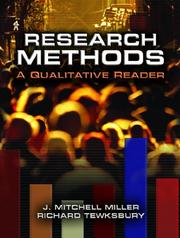| Listing 1 - 3 of 3 |
Sort by
|
Book
ISBN: 0520964624 9780520964624 9780520290464 Year: 2016 Publisher: Oakland, California
Abstract | Keywords | Export | Availability | Bookmark
 Loading...
Loading...Choose an application
- Reference Manager
- EndNote
- RefWorks (Direct export to RefWorks)
Domestic drug enforcement takes many forms, from the rural patrol officer who happens upon a small-scale mobile "shake and bake" methamphetamine lab during a routine traffic stop, to the city narcotics detective who initiates a low-level buy-bust operation that nets a few hits of crack cocaine on the street corner, to the local, state, and federal agents working in multiagency task forces that coordinate a sting operation that nets thousands of kilos of near-pure cocaine being transported by tractor-trailer. Regardless of the form, there is a high probability that these authorities have exploited access to known offenders and exerted pressure on those individuals to gather inside information on illicit drug sales. These confidential informants provide intelligence on the inner workings of drug operations in exchange for leniency or remuneration, providing a relatively cheap source of intelligence that fuels much of the ongoing war on drugs. In other instances, law enforcement authorities will reach out to members of the criminal underworld who are willing to provide valuable intelligence in exchange for money. Despite the central role of informants in contemporary police operations, little is known about the shadowy relationships among law enforcement, snitches, and offenders. Based on ethnographic fieldwork in the narcotics, homicide, and street-level vice operations in two major metropolitan police departments, Speaking Truth to Power takes readers to the front lines of the war on drugs to unravel this complex web of information exchange.
Drug control --- Informers --- Informants (Criminal investigation) --- Police informers --- Stool pigeons --- Complaints (Criminal procedure) --- Crime prevention --- Criminal investigation --- Prosecution --- State's evidence --- Snitches (Informers) --- Persons --- ci. --- confidential informant. --- criminal cases. --- criminal law. --- criminal. --- dea. --- drug dealer. --- drug enforcement. --- drug law. --- drugs. --- ethnographic. --- ethnography. --- fieldwork. --- homicide. --- illegal drugs. --- informants. --- law enforcement. --- meth lab. --- metropolitan. --- narcotics officer. --- narcotics. --- police departments. --- police officer. --- police work. --- police. --- snitches. --- traffic stop. --- true crime. --- true story. --- vice. --- war on drugs.

ISBN: 0131690256 Year: 2006 Publisher: Upper Saddle River Prentice Hall
Abstract | Keywords | Export | Availability | Bookmark
 Loading...
Loading...Choose an application
- Reference Manager
- EndNote
- RefWorks (Direct export to RefWorks)
Criminal anthropology --- Criminal anthropology --- Criminal behavior --- Deviant behavior --- Fieldwork --- Research --- Research --- Research
Book
ISBN: 9780398087999 0398087997 9780398087982 0398087989 Year: 2014 Publisher: Springfield, Illinois
Abstract | Keywords | Export | Availability | Bookmark
 Loading...
Loading...Choose an application
- Reference Manager
- EndNote
- RefWorks (Direct export to RefWorks)
This third edition is designed as an introduction to research methods in criminal justice techniques. The detailed information that is generated by research is a management tool that has become a significant part of criminal justice operations. The text discusses the purposes, process, and uses of research that focus on identifying what information is already known about a particular topic or question. Ethical issues in criminal justice research are reviewed, as is investigating the validity and reliability of crime data sources. Also offered is an introduction to research design--the plan or
Criminal justice, Administration of --- Research --- Methodology.
| Listing 1 - 3 of 3 |
Sort by
|

 Search
Search Feedback
Feedback About UniCat
About UniCat  Help
Help News
News